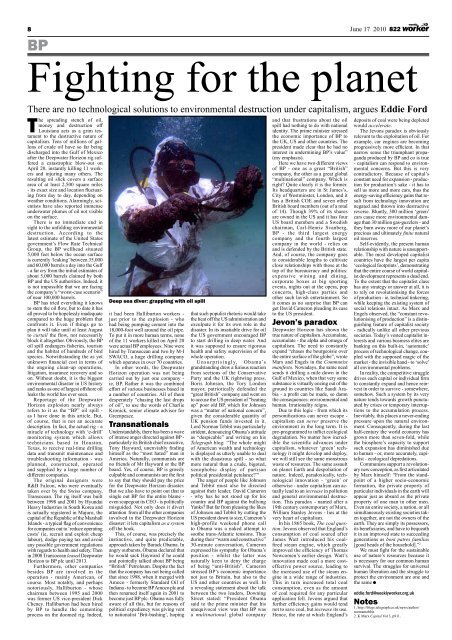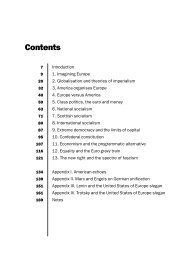PDF format - Communist Party of Great Britain
PDF format - Communist Party of Great Britain
PDF format - Communist Party of Great Britain
Create successful ePaper yourself
Turn your PDF publications into a flip-book with our unique Google optimized e-Paper software.
8<br />
June 17 2010 822<br />
BP<br />
Fighting for the planet<br />
There are no technological solutions to environmental destruction under capitalism, argues Eddie Ford<br />
The spreading stench <strong>of</strong> oil,<br />
money and destruction <strong>of</strong>f<br />
Louisiana acts as a grim testament<br />
to the destructive nature <strong>of</strong><br />
capitalism. Tens <strong>of</strong> millions <strong>of</strong> gallons<br />
<strong>of</strong> crude oil have so far being<br />
discharged into the Gulf <strong>of</strong> Mexico<br />
after the Deepwater Horizon rig suffered<br />
a catastrophic blow-out on<br />
April 20, instantly killing 11 workers<br />
and injuring many others. The<br />
resulting oil slick covers a surface<br />
area <strong>of</strong> at least 2,500 square miles<br />
- its exact size and location fluctuating<br />
from day to day, depending on<br />
weather conditions. Alarmingly, scientists<br />
have also reported immense<br />
underwater plumes <strong>of</strong> oil not visible<br />
on the surface.<br />
There is no immediate end in<br />
sight to the unfolding environmental<br />
destruction. According to the<br />
latest estimate <strong>of</strong> the United States<br />
government’s Flow Rate Technical<br />
Group, the BP wellhead situated<br />
5,000 feet below the ocean surface<br />
is currently ‘leaking’ between 35,000<br />
and 60,000 barrels a day into the Gulf<br />
- a far cry from the initial estimates <strong>of</strong><br />
about 5,000 barrels claimed by both<br />
BP and the US authorities. Indeed, it<br />
is not impossible that we are facing<br />
the company’s “worst-case scenario”<br />
<strong>of</strong> near 100,000 barrels.<br />
BP has tried everything it knows<br />
to stem the oil flow, but to date it has<br />
all proved to be hopelessly inadequate<br />
compared to the huge problem that<br />
confronts it. Even if things go to<br />
plan it will take until at least August<br />
to curtail the flow, not necessarily<br />
block it altogether. Obviously, the BP<br />
oil spill endangers fisheries, tourism<br />
and the habitat <strong>of</strong> hundreds <strong>of</strong> bird<br />
species. Notwithstanding the as yet<br />
unknown financial cost in terms <strong>of</strong><br />
the ongoing clean-up operations,<br />
litigation, insurance recovery and so<br />
on. Without doubt, it is the biggest<br />
environmental disaster in US history<br />
and ranks as one <strong>of</strong> largest <strong>of</strong>fshore oil<br />
leaks the world has ever seen.<br />
Reportage <strong>of</strong> the Deepwater<br />
Horizon explosion nearly always<br />
refers to it as the “BP” oil spill -<br />
as I have done in this article. But,<br />
<strong>of</strong> course, that is not an accurate<br />
description. In fact, the actual rig - a<br />
miracle <strong>of</strong> technology with ‘e-drill’<br />
monitoring system which allows<br />
technicians based in Houston,<br />
Texas, to receive real-time drilling<br />
data and transmit maintenance and<br />
troubleshooting in<strong>format</strong>ion - was<br />
planned, constructed, operated<br />
and supplied by a large number <strong>of</strong><br />
different companies.<br />
The original designers were<br />
R&B Falcon, who were eventually<br />
taken over by the Swiss company,<br />
Transocean. The rig itself was built<br />
between 1998 and 2001 by Hyundai<br />
Heavy Industries in South Korea and<br />
is actually registered in Majuro, the<br />
capital <strong>of</strong> the Republic <strong>of</strong> the Marshall<br />
Islands - a typical flag <strong>of</strong> convenience<br />
for companies out to ‘reduce operating<br />
costs’ (ie, recruit and exploit cheap<br />
labour), dodge paying tax and avoid<br />
any possible government regulations<br />
with regards to health and safety. Then<br />
in 2008 Transocean leased Deepwater<br />
Horizon to BP plc until 2013.<br />
Furthermore, other companies<br />
besides BP are involved in the<br />
operation - mainly American, <strong>of</strong><br />
course. Most notably, and perhaps<br />
notoriously, Halliburton - whose<br />
chairman between 1995 and 2000<br />
was former US vice-president Dick<br />
Cheney. Halliburton had been hired<br />
by BP to handle the cementing<br />
process on the doomed rig. Indeed,<br />
Deep sea diver: grappling with oil spill<br />
it had been Halliburton workers -<br />
just prior to the explosion - who<br />
had being pumping cement into the<br />
18,000-foot well around the oil pipe.<br />
To put it in more human terms, none<br />
<strong>of</strong> the 11 workers killed on April 20<br />
were actual BP employees. Nine were<br />
hired by Transocean and two by M-I<br />
SWACO, a huge drilling company<br />
which operates in over 70 countries.<br />
In other words, the Deepwater<br />
Horizon operation was not being<br />
carried out by just one company -<br />
ie, BP. Rather it was the combined<br />
effort <strong>of</strong> various businesses based in<br />
a number <strong>of</strong> countries. All <strong>of</strong> them<br />
desperately “chasing the last drops<br />
<strong>of</strong> oil”, to use the words <strong>of</strong> Charlie<br />
Kronick, senior climate advisor for<br />
Greenpeace.<br />
Transnationals<br />
Understandably, there has been a wave<br />
<strong>of</strong> intense anger directed against BP -<br />
particularly its British chief executive,<br />
Tony Hayward, unenviably finding<br />
himself as the “most hated” man in<br />
America. Naturally, communists are<br />
no friends <strong>of</strong> Mr Hayward or the BP<br />
board. Yes, <strong>of</strong> course, BP is grossly<br />
culpable and communists are the first<br />
to say that they should pay the price<br />
for the Deepwater Horizon disaster.<br />
But we also have to point out that to<br />
single out BP for the entire blame -<br />
even scapegoat its CEO - is politically<br />
misguided. Not only does it divert<br />
attention from all the other companies<br />
involved in the Deepwater Horizon<br />
disaster: it lets capitalism as a system<br />
<strong>of</strong>f the hook.<br />
This, <strong>of</strong> course, was precisely the<br />
instinctive, and quite predictable,<br />
approach taken by Barack Obama. In<br />
angry outbursts, Obama declared that<br />
he would sack Hayward if he could<br />
and pointedly talked about BP being<br />
“British” Petroleum. Despite the fact<br />
that the company has not being called<br />
that since 1998, when it merged with<br />
Amoco - formerly Standard Oil <strong>of</strong><br />
Indiana - to become BP Amoco plc and<br />
then renamed itself again in 2001 to<br />
become just BP plc. Obama was fully<br />
aware <strong>of</strong> all this, but for reasons <strong>of</strong><br />
political expediency was giving vent<br />
to nationalist ‘Brit-bashing’, hoping<br />
that such populist rhetoric would take<br />
the heat <strong>of</strong>f the US administration and<br />
exculpate it for its own role in the<br />
disaster. In its insatiable drive for oil<br />
the US government encouraged BP<br />
to start drilling in deep water. And<br />
it was supposed to ensure rigorous<br />
health and safety supervision <strong>of</strong> the<br />
whole operation.<br />
Unsurprisingly, Obama’s<br />
grandstanding drew a furious reaction<br />
from sections <strong>of</strong> the Conservative<br />
<strong>Party</strong> and the UK rightwing press.<br />
Boris Johnson, the Tory London<br />
mayor, patriotically defended the<br />
“great British” company and went on<br />
to accuse the US president <strong>of</strong> “beating<br />
up” poor old BP, which for Johnson<br />
was a “matter <strong>of</strong> national concern”,<br />
given the considerable quantity <strong>of</strong><br />
UK pension funds invested in it.<br />
Lord Norman Tebbit was particularly<br />
strident, denouncing Obama’s attitude<br />
as “despicable” and writing on his<br />
Telegraph blog: “The whole might<br />
<strong>of</strong> American wealth and technology<br />
is displayed as utterly unable to deal<br />
with the disastrous spill - so what<br />
more natural than a crude, bigoted,<br />
xenophobic display <strong>of</strong> partisan<br />
political presidential petulance?” 1<br />
The anger <strong>of</strong> people like Johnson<br />
and Tebbit must also be directed<br />
against their leader, David Cameron<br />
- why has he not stood up for his<br />
country and BP against the bullying<br />
Yanks? But far from pleasing the likes<br />
<strong>of</strong> Johnson and Tebbit by cutting the<br />
US president down to size, Cameron’s<br />
high-pr<strong>of</strong>ile weekend phone call<br />
to Obama was a naked attempt to<br />
soothe trans-Atlantic tensions. Thus<br />
during their “warm and constructive”<br />
30-minute conversation, Cameron<br />
expressed his sympathy for Obama’s<br />
position - whilst the latter was<br />
naturally keen to deny the charge<br />
<strong>of</strong> being “anti-British”. Cameron<br />
stressed BP’s economic importance<br />
not just to <strong>Britain</strong>, but also to the<br />
US and other countries as well. In<br />
a revealing statement about the talk<br />
between the two leaders, Downing<br />
Street stated: “President Obama<br />
said to the prime minister that his<br />
unequivocal view was that BP was<br />
a multinational global company<br />
and that frustrations about the oil<br />
spill had nothing to do with national<br />
identity. The prime minister stressed<br />
the economic importance <strong>of</strong> BP to<br />
the UK, US and other countries. The<br />
president made clear that he had no<br />
interest in undermining BP’s value”<br />
(my emphasis).<br />
Here we have two different views<br />
<strong>of</strong> BP - one as a great “British”<br />
company, the other as a great global<br />
“multinational” company. Which is<br />
right? Quite clearly it is the former.<br />
Its headquarters are in St James’s,<br />
City <strong>of</strong> Westminster, London, and it<br />
has a British COE and seven other<br />
British board members (out <strong>of</strong> a total<br />
<strong>of</strong> 14). Though 39% <strong>of</strong> its shares<br />
are owned in the US and it has four<br />
US board members and a Swedish<br />
chairman, Carl-Henric Svanberg,<br />
BP - the third largest energy<br />
company and the fourth largest<br />
company in the world - relies on<br />
and is defended by the British state.<br />
And, <strong>of</strong> course, the company goes<br />
to considerable lengths to cultivate<br />
close relationships with those at the<br />
top <strong>of</strong> the bureaucracy and politics:<br />
expensive wining and dining,<br />
corporate boxes at big sporting<br />
events, nights out at the opera, pop<br />
concerts, high-class parties and<br />
other such lavish entertainment. So<br />
it comes as no surprise that BP can<br />
get David Cameron pleading its case<br />
to the US president.<br />
Jevon’s paradox<br />
Deepwater Horizon has shown the<br />
true nature <strong>of</strong> capitalism. Accumulate,<br />
accumulate - the alpha and omega <strong>of</strong><br />
capitalism. The need to constantly<br />
expand “chases the bourgeoisie over<br />
the entire surface <strong>of</strong> the globe”, wrote<br />
Marx and Engels in the <strong>Communist</strong><br />
manifesto. Nowadays, the same need<br />
sends it drilling a mile down in the<br />
Gulf <strong>of</strong> Mexico, when that very same<br />
substance is virtually oozing out <strong>of</strong> the<br />
ground in countries like Saudi Arabia<br />
- a pr<strong>of</strong>it can be made, so damn<br />
the consequences: environmental and<br />
human. Irrationality reigns.<br />
Due to this logic - from which its<br />
personifications can never escape -<br />
capitalism can never preserve the<br />
environment in the long term. It is<br />
pre-programmed to inflict ecological<br />
degradation. No matter how incredible<br />
the scientific advances under<br />
capitalism, whatever ‘green’ technology<br />
it might develop and deploy,<br />
we will still see the same monstrous<br />
waste <strong>of</strong> resources. The same assault<br />
on planet Earth and despoliation <strong>of</strong><br />
nature. Indeed, paradoxically, technological<br />
innovation - ‘green’ or<br />
otherwise - under capitalism can actually<br />
lead to an increase in pollution<br />
and general environmental destruction.<br />
This paradox - named after a<br />
19th century contemporary <strong>of</strong> Marx,<br />
William Stanley Jevons - lies at the<br />
very heart <strong>of</strong> capitalism.<br />
In his 1865 book, The coal question.<br />
Jevons observed that England’s<br />
consumption <strong>of</strong> coal soared after<br />
James Watt introduced his coalfired<br />
steam engine, which greatly<br />
improved the efficiency <strong>of</strong> Thomas<br />
Newcomen’s earlier design. Watt’s<br />
innovation made coal a more costeffective<br />
power source, leading to<br />
the increased use <strong>of</strong> the steam engine<br />
in a wide range <strong>of</strong> industries.<br />
This in turn increased total coal<br />
consumption, even as the amount<br />
<strong>of</strong> coal required for any particular<br />
application fell. Jevons argued that<br />
further efficiency gains would tend<br />
not to save coal, but increase its use.<br />
Hence, the rate at which England’s<br />
deposits <strong>of</strong> coal were being depleted<br />
would accelerate.<br />
The Jevons paradox is obviously<br />
relevant to the exploitation <strong>of</strong> oil. For<br />
example, car engines are becoming<br />
progressively more efficient. In that<br />
narrow sense the triumphant propaganda<br />
produced by BP and co is true<br />
- capitalism can respond to environmental<br />
concerns. But this is very<br />
contradictory. Because <strong>of</strong> capital’s<br />
constant need for expansion - production<br />
for production’s sake - it has to<br />
sell us more and more cars, thus the<br />
energy-saving efficiency gains that result<br />
from technology innovation are<br />
negated and thrown into destructive<br />
reverse. Bluntly, 300 million ‘green’<br />
cars cause more environmental damage<br />
than 30 million gas-guzzlers - and<br />
they burn away more <strong>of</strong> our planet’s<br />
precious and ultimately finite natural<br />
oil reserves.<br />
Self-evidently, the present human<br />
relationship with nature is unsupportable.<br />
The most developed capitalist<br />
countries have the largest per capita<br />
‘ecological footprints’, demonstrating<br />
that the entire course <strong>of</strong> world capitalist<br />
development represents a dead end.<br />
To the extent that the capitalist class<br />
has any strategy or answer at all, it is<br />
to rely on revolutionising the forces<br />
<strong>of</strong> production - ie, technical tinkering,<br />
while keeping the existing system <strong>of</strong><br />
social relations intact. As Marx and<br />
Engels observed, the “constant revolutionising<br />
<strong>of</strong> production” is a distinguishing<br />
feature <strong>of</strong> capitalist society<br />
- radically unlike all other previous<br />
societies. Today’s vested capitalist interests<br />
and various business elites are<br />
banking on this built-in, ‘automatic’<br />
process <strong>of</strong> technological change, coupled<br />
with the supposed magic <strong>of</strong> the<br />
market - the invisible hand - to ‘solve’<br />
all environmental problems.<br />
In reality, the competitive struggle<br />
drives each capital or individual firm<br />
to constantly expand and hence reinvest<br />
in order to survive - somewhere,<br />
somehow. Such a system by its very<br />
nature tends towards growth punctuated<br />
by crises or temporary interruptions<br />
to the accumulation process.<br />
Inevitably, this places a never-ending<br />
pressure upon the natural environment.<br />
Consequently, during the last<br />
half-century the world economy has<br />
grown more than seven-fold, while<br />
the biosphere’s capacity to support<br />
such expansion has diminished due<br />
to human - or, more accurately, capitalist<br />
- ecological depredations.<br />
<strong>Communist</strong>s support a revolutionary<br />
new conception, as first articulated<br />
by Marx himself: “From the standpoint<br />
<strong>of</strong> a higher socio-economic<br />
<strong>format</strong>ion, the private property <strong>of</strong><br />
particular individuals in the earth will<br />
appear just as absurd as the private<br />
property <strong>of</strong> one man in other men.<br />
Even an entire society, a nation, or all<br />
simultaneously existing societies taken<br />
together, are not the owners <strong>of</strong> the<br />
earth. They are simply its possessors,<br />
its beneficiaries, and have to bequeath<br />
it in an improved state to succeeding<br />
generations as boni patres familias<br />
[good heads <strong>of</strong> the household].” 2<br />
We must fight for the sustainable<br />
use <strong>of</strong> nature’s resources because it<br />
is necessary for our common human<br />
survival. The struggles for universal<br />
human liberation and the struggle to<br />
protect the environment are one and<br />
the same l<br />
eddie.ford@weeklyworker.org.uk<br />
Notes<br />
1. http://blogs.telegraph.co.uk/news/author/<br />
normantebbit.<br />
2. K Marx Capital Vol 3, p911.






